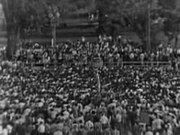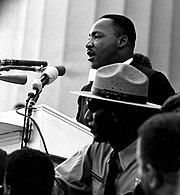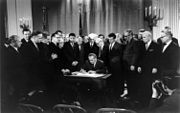High points
| Black Civil Rights in the USA : High Points | ||
|---|---|---|
| High Points | The March on Washington | The Civil Rights Act | Dr. King is awarded the Nobel Prize | |
Contents
The march on Washington (1963)
- 23rd of August
- Biggest civil rights march ever held in the United States
- Organised by organisations such as NAACP, SCLC, SNCC
- Original aim was to focus on black employment issue
- However, the aim was changed to supported Civil Rights Act when President Kennedy expressed concerns that the march could impact negatively on the Act.
- "I have a Dream"
- 200,000 Americans march to support the Civil Rights Bill
Aim
- Passage of the Kennedy Administration's civil rights legislative package—"without compromise or filibuster";
- Integration of all public schools by the end of this year;
- A federal program to "train and place all unemployed workers—Negroes or white—in meaningful and dignified jobs at decent wages";
- A federal Fair Employment Practices Act barring all job discrimination.
Route
The march itself would go only from the Washington Monument to the Lincoln Memorial
- Washington Monument - commemorates the founder of the US
- Lincoln Memorial - commemorates the president who abolished slavery
Statistics
200,000 estimated by the police 300,000 estimated by the organisers
Importance
"Dr. King had the power, the ability and the capacity to transform those steps on the Lincoln Memorial into a monumental area that will forever be recognized . By speaking the way he did, he educated, he inspired, he informed not just the people there, but people throughout America and unborn generations."
Quotations
I Have a Dream by Martin Luther King Jr.
- "I have a dream that one day this nation will rise up and live out the true meaning of its creed: 'We hold these truths to be self-evident, that all men are created equal.'
- "I have a dream that my four little children will one day live in a nation where they will not be judged by the colour of their skin, but by the content of their character."
- "I have a dream that one day on the red hills of Georgia the sons of former slaves and the sons of former slave owners will be able to sit down together at a table of brotherhood."
The Civil Rights Act (1964)
It was a landmark piece of legislation in the United States that outlawed racial segregation in schools, public places, and employment.Controversy
It involved the Federal government taking control over matters which many states believed were their own concern.
Three reasons why it passed
- Success of 1963 March on Washington - had strong effect on the national opinion
- Wave of sympathy that swept America after the assassination of President Kennedy in 1963
- President Lyndon Johnson saw the value of black voter in the upcoming presidential election. - Active support from the president
Provisions
- Gave the Federal Government the power to enforce desegregation of all public accommodation
- Outlawed discrimination of all publicly owned facilities as well as in employment.
Effect
- Did not bring significant change overnight as many sections were hard to enforce
- Make it hard for blacks to register to vote
- Some shops, schools and businesses closed down rather than desegregation
- Black had right to sue shops, restaurants, etc... which denied them equal access.
- Many southern states had to put an end to many of their segregationist policies.
- Legal support for the Civil Rights movement
Dr. King is awarded the Nobel Peace Prize
- Martin Luther King Jr was awarded this prize
- At the age of 35, we was the youngest person to receive the award
- The cash won was divided among the organisations working in the civil rights movement
- King did not consider the award was for him personally. He said it was:
"a tribute to the disciplined, wise restraint and majestic courage of gallant Negro and white persons of goodwill who have followed a non-violent cause"
How many of these key terms can you describe?
|


